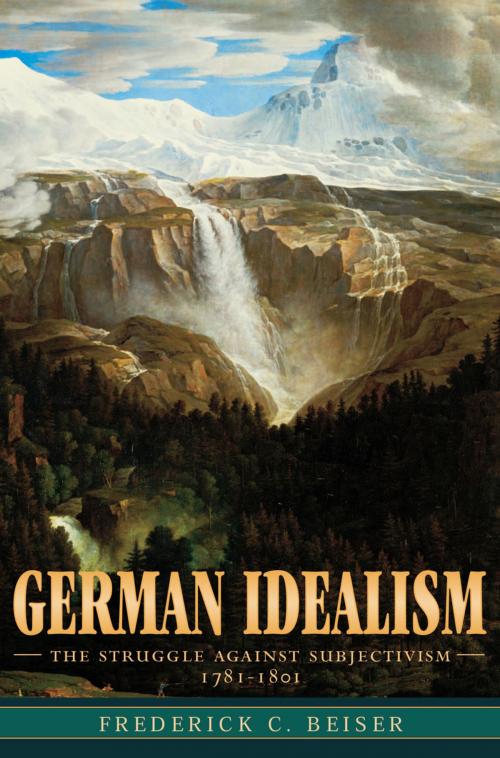German Idealism
The Struggle against Subjectivism, 1781–1801
Nonfiction, Religion & Spirituality, Philosophy, Modern, Ethics & Moral Philosophy| Author: | Frederick C. BEISER | ISBN: | 9780674971219 |
| Publisher: | Harvard University Press | Publication: | June 30, 2009 |
| Imprint: | Harvard University Press | Language: | English |
| Author: | Frederick C. BEISER |
| ISBN: | 9780674971219 |
| Publisher: | Harvard University Press |
| Publication: | June 30, 2009 |
| Imprint: | Harvard University Press |
| Language: | English |
One of the very few accounts in English of German idealism, this ambitious work advances and revises our understanding of both the history and the thought of the classical period of German philosophy. As he traces the structure and evolution of idealism as a doctrine, Frederick Beiser exposes a strong objective, or realist, strain running from Kant to Hegel and identifies the crucial role of the early romantics--Hölderlin, Schlegel, and Novalis--as the founders of absolute idealism.
Traditionally, German idealism is understood as a radical form of subjectivism that expands the powers of the self to encompass the entire world. But Beiser reveals a different--in fact, opposite--impulse: an attempt to limit the powers of the subject. Between Kant and Hegel he finds a movement away from cosmic subjectivity and toward greater realism and naturalism, with one form of idealism succeeding another as each proved an inadequate basis for explaining the reality of the external world and the place of the self in nature. Thus German idealism emerges here not as a radical development of the Cartesian tradition of philosophy, but as the first important break with that tradition.
Table of Contents:
Introduction
- Realism in German Idealism
- Exorcising the Spirit
- The Critique of Foundationalism
- The Troublesome Hegelian Legacy
- The Taxonomy of German Idealism
I. KANT'S CRITIQUE OF IDEALISM
Introduction: Kant and the Problem of Subjectivism
- The Clash of Interpretations
- Method and Results
- Contemporary Kant Scholarship
1. Idealism in the Precritical Years
- The Idealist Challenge
- The First Refutation of Idealism
- Idealist Dreams and Visions
- The Critique of Idealism in the Inaugural Dissertation
- Skeptical Ambivalence
- David Hume, Transcendental Realist
2. Transcendental Idealism and Empirical Realism
- The Case for Subjectivism
- The First Edition Definitions of Transcendental Idealism
- Transcendental versus Empirical Idealism
- Empirical Realism in the Aesthetic
- Empirical Realism and Empirical Dualism
3. The First Edition Refutation of Skeptical Idealism
- The Priority of Skeptical Idealism
- The Critique of the Fourth Paralogism
- The Proof of the External World
- A Cartesian Reply
- Appearances and Spatiality
- The Ambiguity of Transcendental Idealism
- The Coherence of Transcendental Idealism
4. The First Edition Refutation of Dogmatic Idealism
- The Missing Refutation
- Kant's Interpretation of Leibniz
- The Dispute in the Aesthetic
- Dogmatic Idealism in the Antinomies
5. Kant and Berkeley
- The Göttingen Review
- Kant's Reaction
- Berkeleyianism in the First Edition of the Kritik
- The Argument of the Prolegomena
- Kant's Interpretation of Berkeley
- The Small but Real Differences?
6. The Second Edition Refutation of Problematic Idealism
- The Problem of Interpretation
- Kant's Motives
- The Question of Kant's Realism
- Realism in the Refutation
- The New Strategy
- The Argument of the Refutation
- Outer vis-à-vis Inner Sense
- Kant's Refutations in the Reflexionen, 1788-93
7. Kant and the Way of Ideas
- The Theory of Ideas
- Loyalty and Apostasy
- The Transcendental versus the Subjective
- The Question of Consistency
- The Doctrine of Inner Sense
- Kantian Self-Knowledge and the Cartesian Tradition
8. The Transcendental Subject
- Persistent Subjectivism
- Eliminating the Transcendental Subject
- The Criteria of Subjectivity
- The Subjectivity of the Transcendental
- Restoring the Transcendental Subject...
One of the very few accounts in English of German idealism, this ambitious work advances and revises our understanding of both the history and the thought of the classical period of German philosophy. As he traces the structure and evolution of idealism as a doctrine, Frederick Beiser exposes a strong objective, or realist, strain running from Kant to Hegel and identifies the crucial role of the early romantics--Hölderlin, Schlegel, and Novalis--as the founders of absolute idealism.
Traditionally, German idealism is understood as a radical form of subjectivism that expands the powers of the self to encompass the entire world. But Beiser reveals a different--in fact, opposite--impulse: an attempt to limit the powers of the subject. Between Kant and Hegel he finds a movement away from cosmic subjectivity and toward greater realism and naturalism, with one form of idealism succeeding another as each proved an inadequate basis for explaining the reality of the external world and the place of the self in nature. Thus German idealism emerges here not as a radical development of the Cartesian tradition of philosophy, but as the first important break with that tradition.
Table of Contents:
Introduction
- Realism in German Idealism
- Exorcising the Spirit
- The Critique of Foundationalism
- The Troublesome Hegelian Legacy
- The Taxonomy of German Idealism
I. KANT'S CRITIQUE OF IDEALISM
Introduction: Kant and the Problem of Subjectivism
- The Clash of Interpretations
- Method and Results
- Contemporary Kant Scholarship
1. Idealism in the Precritical Years
- The Idealist Challenge
- The First Refutation of Idealism
- Idealist Dreams and Visions
- The Critique of Idealism in the Inaugural Dissertation
- Skeptical Ambivalence
- David Hume, Transcendental Realist
2. Transcendental Idealism and Empirical Realism
- The Case for Subjectivism
- The First Edition Definitions of Transcendental Idealism
- Transcendental versus Empirical Idealism
- Empirical Realism in the Aesthetic
- Empirical Realism and Empirical Dualism
3. The First Edition Refutation of Skeptical Idealism
- The Priority of Skeptical Idealism
- The Critique of the Fourth Paralogism
- The Proof of the External World
- A Cartesian Reply
- Appearances and Spatiality
- The Ambiguity of Transcendental Idealism
- The Coherence of Transcendental Idealism
4. The First Edition Refutation of Dogmatic Idealism
- The Missing Refutation
- Kant's Interpretation of Leibniz
- The Dispute in the Aesthetic
- Dogmatic Idealism in the Antinomies
5. Kant and Berkeley
- The Göttingen Review
- Kant's Reaction
- Berkeleyianism in the First Edition of the Kritik
- The Argument of the Prolegomena
- Kant's Interpretation of Berkeley
- The Small but Real Differences?
6. The Second Edition Refutation of Problematic Idealism
- The Problem of Interpretation
- Kant's Motives
- The Question of Kant's Realism
- Realism in the Refutation
- The New Strategy
- The Argument of the Refutation
- Outer vis-à-vis Inner Sense
- Kant's Refutations in the Reflexionen, 1788-93
7. Kant and the Way of Ideas
- The Theory of Ideas
- Loyalty and Apostasy
- The Transcendental versus the Subjective
- The Question of Consistency
- The Doctrine of Inner Sense
- Kantian Self-Knowledge and the Cartesian Tradition
8. The Transcendental Subject
- Persistent Subjectivism
- Eliminating the Transcendental Subject
- The Criteria of Subjectivity
- The Subjectivity of the Transcendental
- Restoring the Transcendental Subject...















